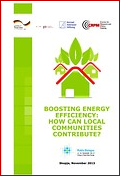
We kindly inform you that, as long as the subject affiliation of our 300.000+ articles is in progress, you might get unsufficient or no results on your third level or second level search. In this case, please broaden your search criteria.

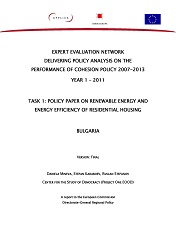
DG Regional Policy at the European Commission published a Report on Bulgaria's progress on the Renewable Energy Sources (RES) and Energy Efficiency in Buildings and an Evaluation Report on the Achievements of the Cohesion Policy in Bulgaria. The two reports were prepared by CSD experts in the framework of the Expert Evaluation Network delivering policy analysis on the performance of the Cohesion Policy 2007 - 2013. The report provides an overview of the available support by the EU Structural Funds and the national instruments promoting RES and energy efficiency in buildings. It also describes the legislative framework and the operation of various state institutions in this area. Tthe report lists the remaining challenges to the management authorities, the businesses and the households which aim to utilize more efficiently the EU financial assistance and to reduce the energy poverty in the country.
More...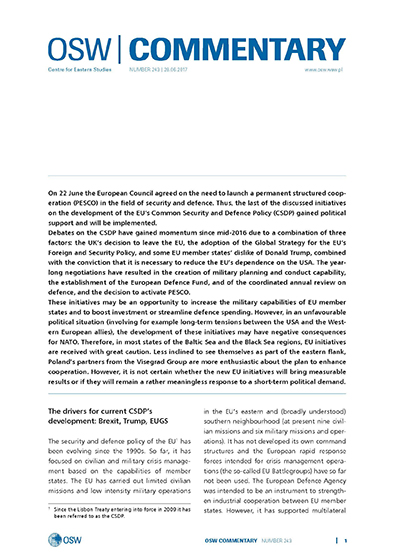
Sweden, Finland and Denmark have seen a revival of the debate on the Nord Stream 2 project in recent months. As the planned gas pipeline will run through these countries’ exclusive economic zones and/or territorial waters, the governments in Stockholm, Helsinki and Copenhagen will have to take a decision on NS2 construction soon. They find themselves in a difficult situation. On one hand, the Russian-Ukrainian war and the deteriorating security situation in the Baltic Sea region have resulted in more distance towards Russian economic projects in these countries. All of them have also come under increasing pressure from the United States, the CEE countries, and domestic opposition parties, which have been demanding the project’s suspension. On the other hand, neither Stockholm, Helsinki nor Copenhagen wants to use their national laws or the Law of the Sea to block Nord Stream 2, which enjoys support from Germany.Sweden, Finland and Denmark are therefore unlikely to block or slow down the procedures of issuing national approvals for the pipeline’s construction. However, they expect the European Commission to assess the compliance of Nord Stream 2 with the EU’s Third Energy Package. In addition, Stockholm and Copenhagen in particular want the EU to take a common political stance on the project, based on the assessment of Nord Stream 2’s conformity with the objectives of EU energy and climate policy as well as the EU’s security interests.
More...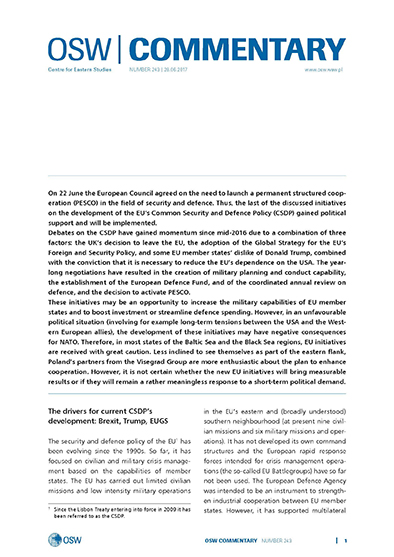
Thirty years after the Chornobyl nuclear power plant disaster, its aftermath and consequences are still a permanent element of the economic, environmental and social situation of Ukraine, Belarus and some regions of Russia. Ukraine, to which the scope of this text is limited, experienced the most severe shock because, among other factors, the plant where the accident took place was located just 100 km away from Kyiv. Its consequences have affected the course of political developments in the country, and have become part of the newly-shaped national identity of independent Ukraine. The country bore the huge cost of the clean-up effort but did not give up on nuclear energy, and today nuclear power plants generate more than half of its electricity. The system of social benefits for people recognised as disaster survivors, which was put in place by the Soviet government, has become a huge burden on the country’s budget; if implemented fully, it would account for more than 10% of total public spending, and is therefore being implemented to only a partial extent. This system has reinforced the Ukrainian people’s sense of helplessness and dependence on the state. The disaster has also become part of the ‘victim nation’ blueprint of the Ukrainian national myth, which it has further solidified. The technological and environmental consequences of the disaster, and hence also its economic costs, will persist for centuries, while the social consequences will dissipate as the affected generation passes away. In any case, Chornobyl will remain an important part of the life of the Ukrainian state and society.
More...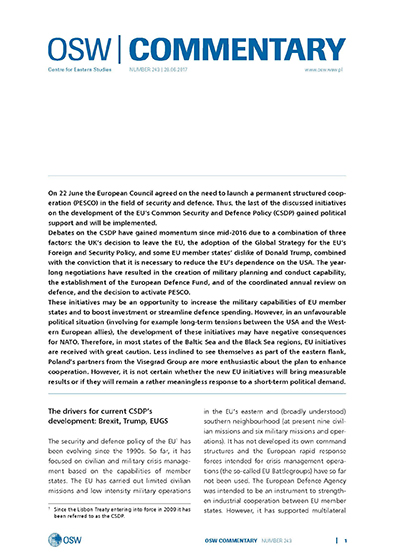
Germany’s current energy strategy, known as the “energy transition”, or Energiewende, involves an accelerated withdrawal from the use of nuclear power plants and the development of renewable energy sources (RES). According to the government’s plans, the share of RES in electricity production will gradually increase from its present rate of 26% to 80% in 2050. Greenhouse gas emissions are expected to fall by 80–95% by 2050 when compared to 1990 levels. However, coal power plants still predominate in Germany’s energy mix – they produced 44% of electricity in 2014 (26% from lignite and 18% from hard coal). This makes it difficult to meet the emission reduction objectives, lignite combustion causes the highest levels of greenhouse gas emissions. In order to reach the emission reduction goals, the government launched the process of accelerating the reduction of coal consumption. On 2 July, the Federal Ministry for Economic Affairs and Energy published a plan to reform the German energy market which will be implemented during the present term of government. Emission reduction from coal power plants is the most important issue. This problem has been extensively discussed over the past year and has transformed into a conflict between the government and the coal lobby. The dispute reached its peak when lignite miners took to the streets in Berlin. As the government admits, in order to reach the long-term emission reduction objectives, it is necessary to completely liquidate the coal energy industry in Germany. This is expected to take place within 25 to 30 years. However, since the decision to decommission nuclear power plants was passed, the German ecological movement and the Green Party have shifted their attention to coal power plants, demanding that these be decommissioned by 2030 at the latest.
More...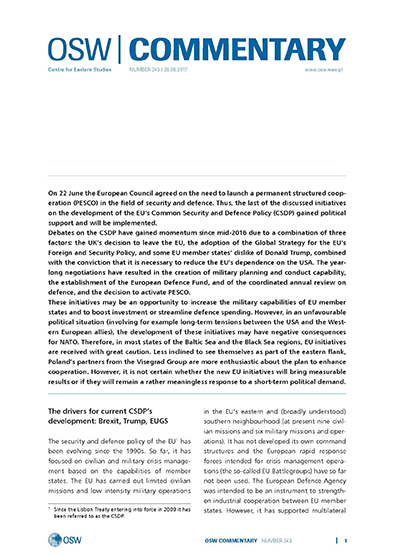
The Lithuanian Seimas approved the government-sponsored proposal for the construction of a new nuclear power plant outside the Lithuanian city of Visaginas on 21 June. MPs cleared the government to sign the concession agreement (initialled 30 March 2012) with Japan’s Hitachi Ltd. Under this deal Hitachi becomes the strategic investor in the project and will provide a 1350-megawatt reactor for the plant.Despite its original plans, the Lithuanian government was unsuccessful in securing a Western investor who would be willing to take on a 51% stake in the project. According to Lithuania’s deal with Hitachi, the Japanese company will receive just 20% of the shares in the future NPP, whose total cost has been estimated at 5 billion euros. Although Hitachi’s investment is going to be significantly lower than initially expected, the company’s decision to back the project and supply it with a modern reactor can be seen as a guarantee that the implementation of the project is financially viable. The majority of the risk however will be shouldered by the Lithuanian state, which will retain a 38% stake in the plant. In addition, the government is currently trying to secure additional investors for the project from across the Baltic Sea region. Estonia has already shown interest in buying a 22% stake in the company, while Latvia might finance another 20% of the project.
More...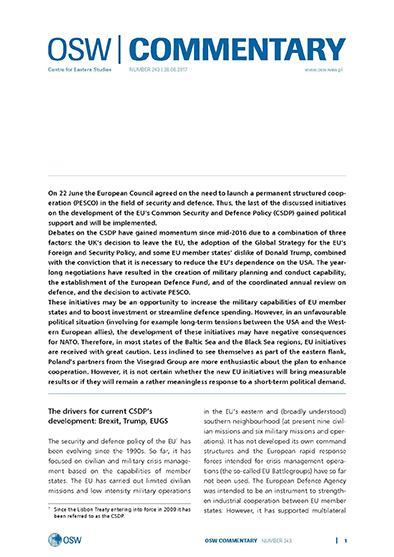
Falling amounts of natural resources and the ‘peak oil’ question, i.e. the point in time when the maximum rate of extraction of easily-accessible oil reserves is reached, have been among the key issues in public debate in Germany on all levels: expert, business and – most crucially – the government level. The alarming assessments of German analysts anticipate a rapid shrinkage of oil reserves and a sharp rise in oil prices, which in the longer term will affect the economic and political systems of importer countries. Concerns about the consequences of the projected resource deficit, especially among representatives of German industry, are also fuelled by the stance of those countries which export raw materials. China, which meets 97% of global demand for minerals crucial for the production of new technologies, cut its exports by 40% in summer 2010 (compared to 2009), arguing that it had to protect its reserves from overexploitation.
More...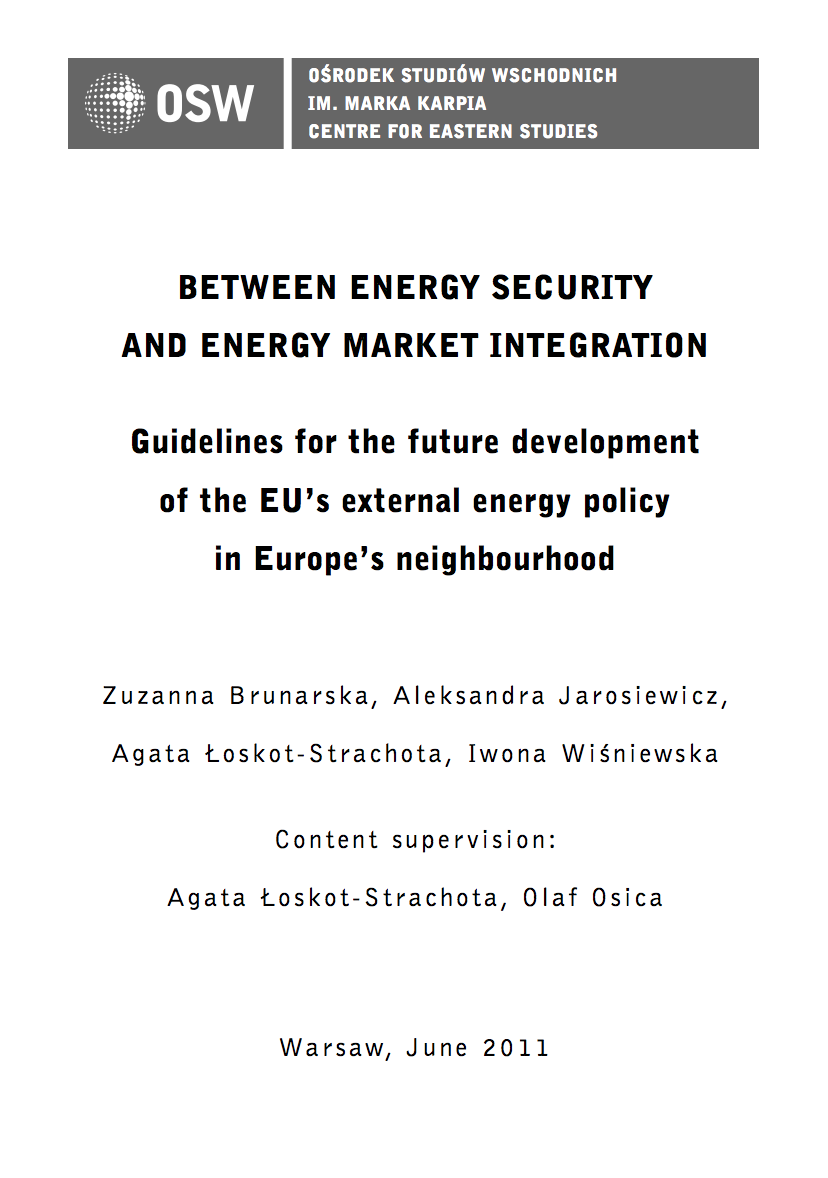
For many years the European Union has been improving the efficient use of energy resources and yet the demand for energy in the EU continues to increase. When Europe belonged to one of the world’s key energy markets with relatively easy access to energy resources, growing energy needs were not seen as a source of concern. Today, however, as the competition for energy resources is intensifying and the global position of the EU energy market is being challenged by growing economies in the developing countries, above all China and India, the EU needs to adopt bold policies to guarantee the sustainable supply of energy.This report argues the EU needs to develop a fully-fledged external energy policy; i.e. a common, coherent, strategic approach that build bridges between the interests and needs of the EU integrated energy market on the one hand and supplier countries on the other.The EU’s external energy policy has two main objectives. The first one is to ensure a sustainable, stable and cost-effective energy supply. The second is to promote energy market integration and regulatory convergence with neighbouring countries (often but not always this supports the achievement of the first objective). However, in order to improve its effectiveness, the EU’s external energy policy needs to be seen in a broader economic and political context. Any progress in energy cooperation with third countries is contingent upon the EU’s general stance and offer to those countries.
More...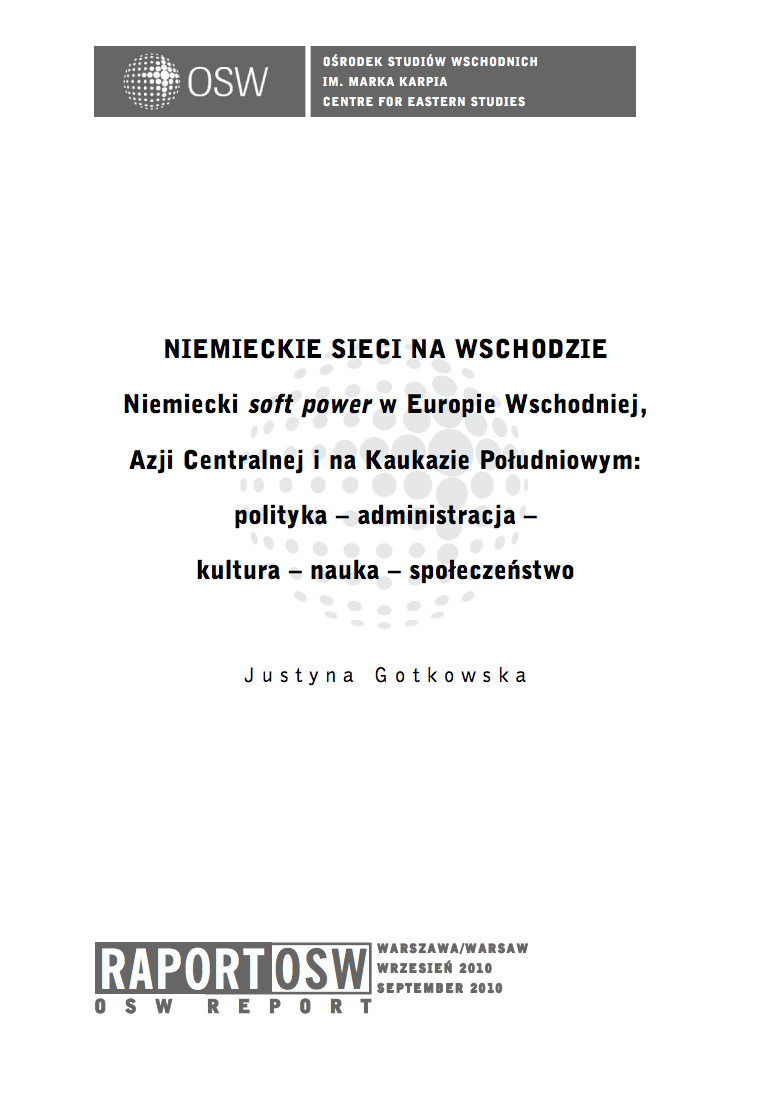
The energy sector, especially with regard to natural gas trade, is one of the key areas of co-operation between the EU and Russia. However, the character of this co-operation has given rise to increasing doubts both in Brussels and among the EU member states. The questions have emerged whether this co-operation does not make the EU excessively dependent on Russian energy supplies, and whether Gazprom's presence in the EU will not allow Moscow to interfere in the proces of devising the EU energy policy. This report is intended to present the factual base and data necessary to provide accurate answers to the foregoing questions. The first part of the report presents the scope and character of Gazprom's economic presence in the EU member states. The second part shows the presence of the EU investors in Russia. The data presented has been provided by the International Energy Agency, European Commission, the Central Bank of Russia and the Russian Federal State Statistics Service. Some of the data is the result of calculations made by the Centre for Eastern Studies' experts who were basing on the data provided by energy companies, the specialist press and news agencies.
More...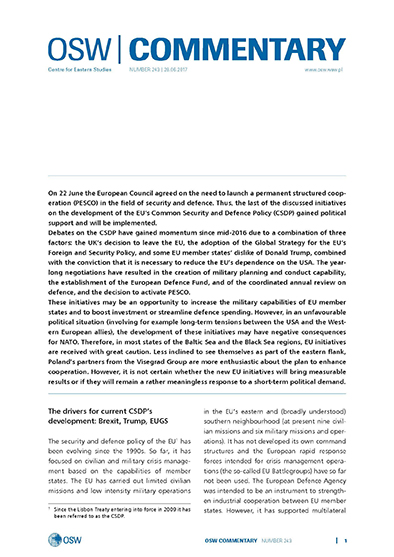
In recent weeks the US has stepped up its campaign against the Nord Stream 2 project. Washington is putting pressure on Berlin to withdraw its support for the project, and is threatening to use increasingly powerful measures, including sanctions on European companies involved in the gas pipeline’s implementation. The growing dispute between the US and Germany over Nord Stream 2 has become an element of the broader controversy surrounding the project in the EU and is leading to deeper divisions between the member states. It has brought to the fore the differences in approaches to gas cooperation with Russia as well as approaches to the development of Russia’s strategic gas pipeline projects. While Germany, but also Austria, the Netherlands and a number of other countries, limit their approach to commercial issues, Poland, the Baltic States, Denmark and the US also see it as having security implications which do not only relate to energy. The conflict over Nord Stream 2 is also part of the game concerning the future shape of the gas market in Europe, and the roles played by individual external suppliers (mainly Russia, but also to an increasing extent the US) and companies such as Gazprom and its European partners. The Nord Stream 2 case has become a major challenge of the EU’s cohesion and its relations with the US and Russia.
More...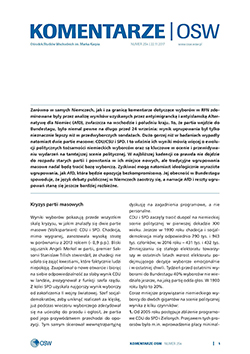
Orzeczenia Trybunału Arbitrażowego w Sztokholmie w sprawie kontraktu na dostawy gazu dla Naftohazu oraz w kwestii wielkości tranzytu rosyjskiego surowca przez Ukrainę radykalnie zmieniają dotychczasowy model relacji gazowych obu państw. Zwycięstwo Kijowa stanowi kulminację procesu jego emancypacji spod rosyjskiej dominacji energetycznej, rozpoczętego po rewolucji godności. Znacząco wzmacnia ono pozycję Ukrainy wobec Rosji, a także względem UE, ponieważ to Gazprom został uznany za stronę naruszającą kontrakt tranzytowy. Decyzje sztokholmskiego arbitrażu stanowią cezurę w trwającej prawie trzy dekady współpracy gazowej Ukrainy i Rosji, naznaczonej korupcją, brakiem przejrzystości i decyzjami motywowanymi politycznie. Od rozpadu ZSRR Ukraina była uzależniona od dostaw rosyjskiego gazu i należała do jednych z kluczowych klientów Gazpromu. Dopóki surowiec był względnie tani, stan ten opowiadał także kontrahentom na Ukrainie, stwarzając wielkie możliwości nielegalnego bogacenia się części ukraińskiej klasy politycznej. Jednak w okresie prezydentury Władimira Putina (od 2000 roku) Moskwa wielokrotnie wykorzystywała zależność gazową Ukrainy do realizacji celów politycznych. Rewolucja godności i wojna z Rosją przyniosły przełom w stosunkach energetycznych obu państw. Nowe władze w Kijowie, w odróżnieniu od wszystkich poprzednich, podjęły ryzyko sporu prawnego z Gazpromem.
More...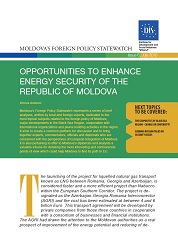
The launching of the project for liquefied natural gas transport known as LNG between Romania, Georgia and Azerbaijan, is considered faster and a more efficient project than Nabucco within the European Southern Corridor. The project is designated as the Azerbaijan-Georgia-Romania Interconnector (AGRI) and the cost has been estimated at between 4 and 6 billion Euro. This transport agreement will be developed by private companies from those three countries in cooperation with a consortium of businesses and financial institutions. The AGRI had drawn the attention to the Moldovan authorities as a real prospect of improvement of the energy potential and reducing of dependence on Russian natural gas. Taking in advance the potential of the project that assures a stable and reliable route of LNG supplies, it might be an advantage for Moldova to be involved in the project. Construction of a liquefied gas terminal in the Giurgiulesti port would be a priority for the energy security of Moldova, especially considering entirely the dependence of country on Russian gas supplies.
More...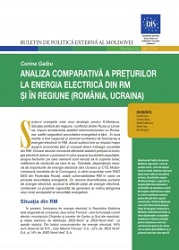
Energy sector is a strategic field for Republic of Moldova Geopolitical situation in the region, the tension between Ukraine and Russia, impose the acceleration of establishing interconnections with Romania, thus ensuring energy security of Republic of Moldova The contract on electrical energy supply to the RM was negotiated and signed in March. The negotiated price has a major impact on country’s economy and directly affects the whole society. Setting the electricity prices excessively high causes extra pressure on the population’s welfare and the monthly bills people pay; while, high dependency on electricity imports from Ukraine and a single generating facility in Transnistria (Steam Electric Power Station ”Moldoveneasca” owned by RAO UES of the Russian Federation) create an energy security vulnerability. Diversifying electrical energy sources through building a connection with Romania allow attaining an acceptable energy security level.
More...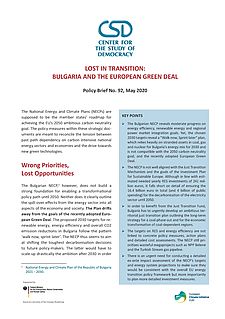
The National Energy and Climate Plans (NECPs) are supposed to be the member states’ roadmap for achieving the EU’s 2050 ambitious carbon neutrality goal. The policy measures within these strategic documents are meant to reconcile the tension between past path dependency on carbon intensive national energy sectors and economies and the drive towards new green technologies. The Bulgarian NECP reveals moderate progress on energy efficiency, renewable energy and regional power market integration goals. Yet it does not build a strong foundation for enabling a transformational policy path until 2050. Neither does it clearly outline the spill-over effects from the energy sector into all aspects of the economy and society. This policy brief analyses the main elements of the final version of the Bulgarian NECP and proposes targeted policy measures on how to better implement it over the next decade.
More...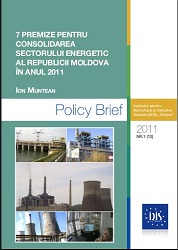
The year 2011 has all the chances to become a fruitful one for the energy sector of the Republic of Moldova by the fact that this year a very favorable situation is created for building the theme of a sustainable development of the energy sector in the Republic of Moldova. In the form of a new government, it offers the Republic of Moldova a new status and a new motivation to contribute to the increase of the country's energy security and to participate in an energy market based on principles of equity and mutual benefits. Through a consistent approach to the problems in the energy sector, an efficient cooperation between the responsible and targeted structures in this sector and the capitalization of all the opportunities that are created in 2011, the achievements can be truly solid.
More...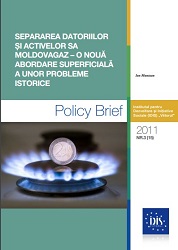
The closer the period of signing a new natural gas procurement contract with the Russian Federation approaches, the more current become the historical problems related to the collaboration between SA Moldovagaz and SAD Gazprom. The stake is the same, obtaining a contract as favorable as possible for both parties since 2012. Obtaining such a result for the Republic of Moldova is conditioned by the historical debts that have accumulated to Gazprom. The problem would be much simpler if there were only debts accumulated on the right side of the Dniester, but since the Transnistrian region is in the middle, the situation is even more complicated. The purpose of this policy brief is not to propose and argue solutions for the possibilities of debt settlement but to clearly identify the problems that formed these debts and risk generating new donations to Gazprom.
More...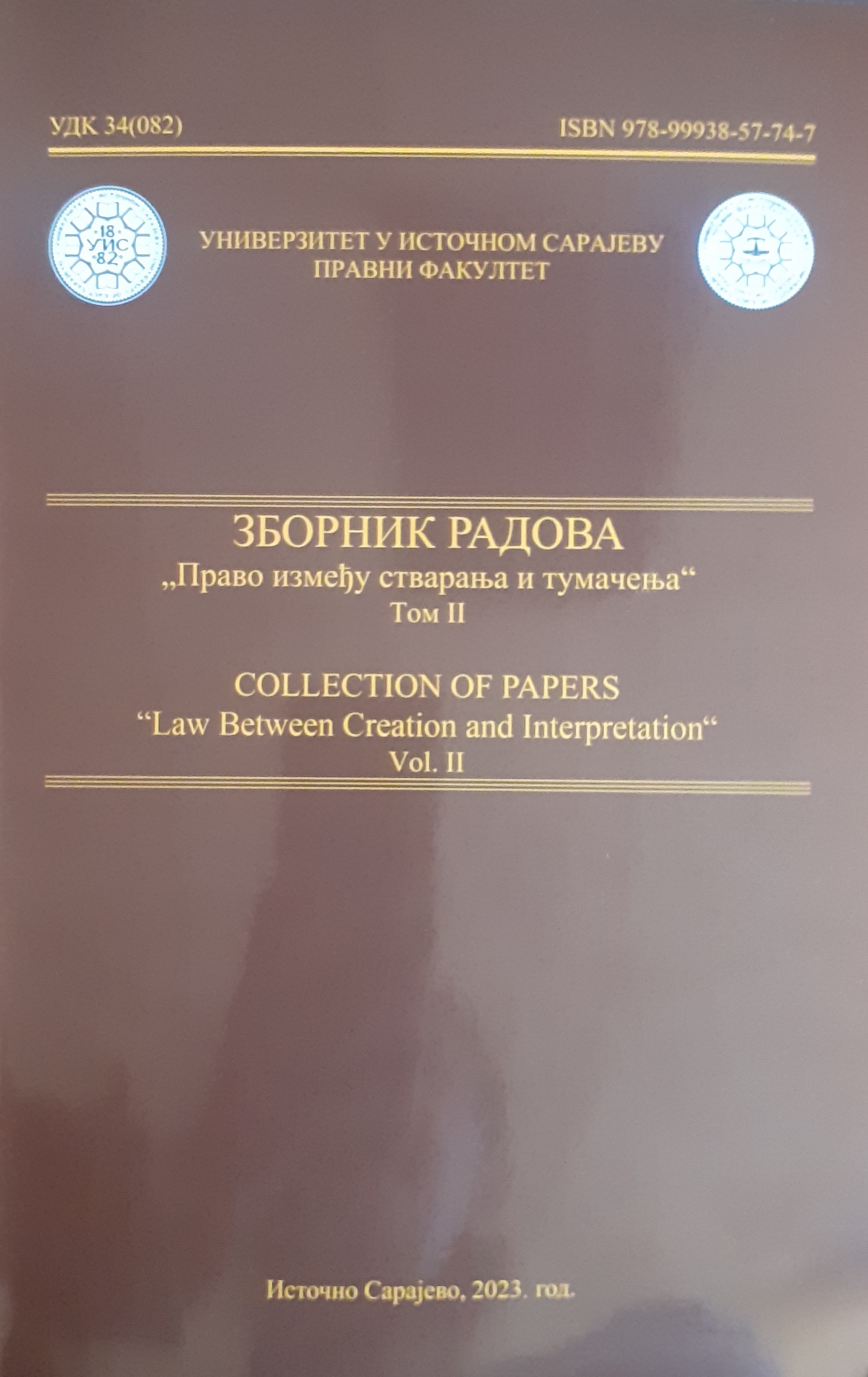
The author of this article deals with liability of nuclear ship operator for nuclear damage. He analyzes the legal solution in five acts in Bosnia and Herzegovina: Inland Navigation Act of Republic of Srpska (2001), Maritime and Inland Navigation Act of Bosnia and Herzegovina (1992), Inland and Maritime Navigation Act of the Federation of Bosnia and Herzegovina (2005), Inland Navigation Act of Brčko District of Bosnia and Herzegovina (2008) and Act of Liability for Nuclear Damage of Bosnia and Herzegovina (1992). These acts are compared with Croatian Maritime Code (2004) and Croatian Inland Waterway Ports Act (2021)
More...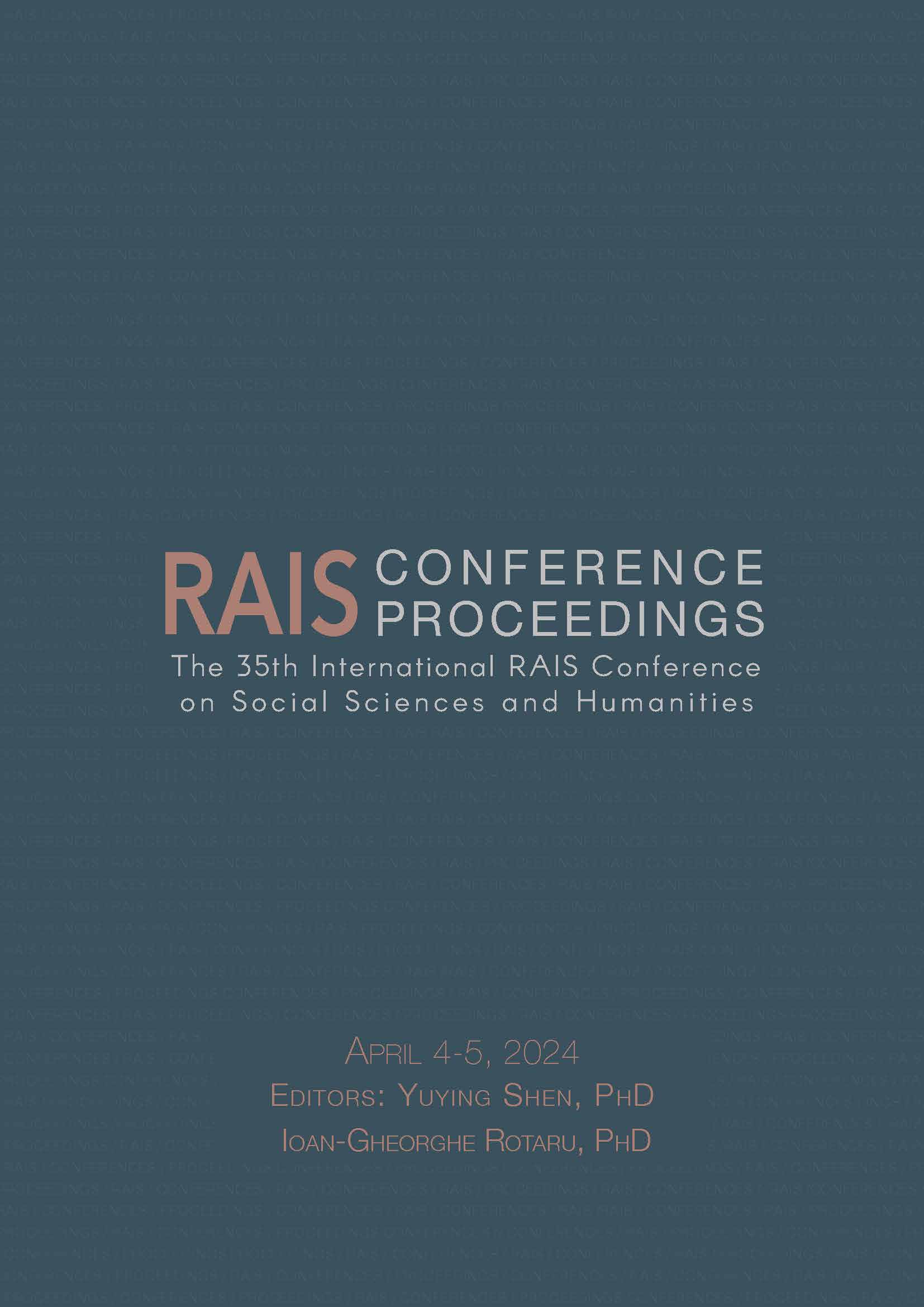
One of the hallmarks of macroeconomics is the Keynesian multiplier. John Maynard Keynes described the multiplying effect of new investments in the economy to have multifaceted influences on the overall wellbeing of nations. The notion that investments drive economic activity and growth is consolidated with many empirical findings in different domains. Interestingly, hardly any account exists on intertemporal aspects of Keynes’ multiplier. The discounting and temporal elements of multiplying effects and the time-lag for investments to bloom in the economy are – to this day – not captured. Behavioral economics offers ample account on discounting. People are found to focus on the present rather than discounting for future instances properly. Integrating a temporal element into the Keynesian multiplier effect offers opportunities to understand the long-term benefits of green investments. Environmentally-conscientious finance has seen an advent in most recent decades. To this day, however, there is no clear account of the performance of green funds. Temporal aspects in Keynes’ multiplier may help understand the difficulty in determining the long-term advantages of green investments. Adding information on the long-term benefits of green funds may also serve contemporary endeavors to capture wealth in nature. This article is organized as follows: First, an introduction describes Keynes’ multiplier and temporal discounting. Then the need for integrating temporal aspects into Keynes’ multiplier is outlined. The application of temporal Keynes’ multiplier aspects in the green investment domain is provided. The discussion closes with a prospect for future research avenues.
More...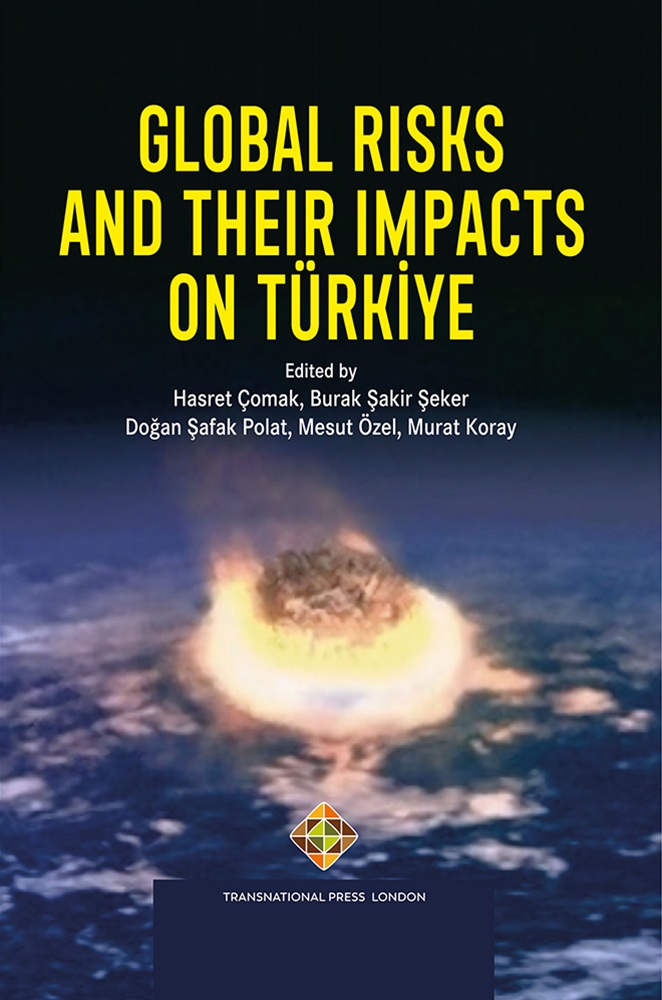
Türkiye’s geographical location has positioned it as an important player in the global energy environment. Türkiye has become an important transit route for fossil fuels, especially natural gas, between the energy-rich Middle East and the Caucasus and energy-consuming Europe. In the last decade, Türkiye aimed to transform itself into a regional energy hub where energy resources are transferred in transit and traded by international sellers and buyers. Under the current conditions, Türkiye is seen as the most promising transit country candidate in energy chess. While it will enable it to meet its energy demand more easily, it will also carry one-fifth of the EU’s energy demand in the medium and long term and will also contribute to the socialization process of the Caspian and Middle Eastern regions by integrating them into the global energy transportation network. Türkiye’s pragmatic energy policy, on which the impact of daily political tensions and regional changes is limited, is an important indicator of its determination to become an energy transition and distribution center. This goal was first brought to the agenda right after the Cold War, based on the rich energy resources of the Central Asian and Caucasian countries with which Türkiye has strong cultural ties, but the fact is that Türkiye’s performance in the region was well below expectations in the first half of the 90s. However, due to geopolitical ruptures and tensions in international relations, it is not surprising that “Türkiye has become a vital transit corridor for energy resources” especially natural gas, as a critical supplier in meeting Europe’s basic energy needs, especially in the last decade.”
More...
The Black Sea Region has been an area where security and environment merge and provide an useful ground for related analysis. It has been rich in energy resources. For instance the Black Sea Basin “is the second largest source of oil natural gas after the Persian Gulf”. The Black Sea also has rich potential regarding renewable resources like hydro, solar and wind energy.
More...